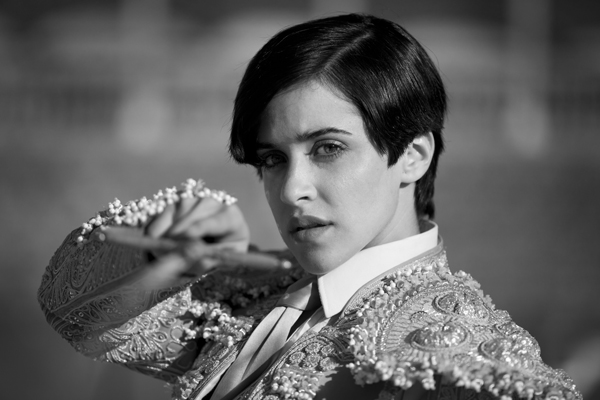“Never take your eyes off the bull.”
Remember how The Artist stole the show at 2011’s Oscars unexpectedly? You know, the little indie that could that looked like it was straight out of the 1900s? Of course you do! Because it was phenomenal, and unexpected; for the first time in a while people weren’t so much in awe over a trio of superheros blowing up cities, no (OK, they definitely still were), but rather in love with Michel Hazanavicius’ story done perfectly in this colorless medium (plus Uggie!).
And in the latest move of reviving the a quieter black and white medium, Spanish director Pablo Berger’s Blancanieves does wonders! The movie attaches to a very Españan way of life—the music, the buildings, the bullfights—that’s based loosely on the classic fairy tale Snow White. Except for the tale’s a little bit darker than the Disney movie we saw many years ago. Ohh yes, much darker.
Set in the charming countryside of Seville, Spain, you have a very famous bullfighter Antonio Villalta (Daniel Giménez Cacho)—a cocky one at that!—known famously for his “never-failing” bullfighting techniques. Or well, at least up until one night when he unexpectedly goes down to the ground and ends up losing to a pretty angry bull. While all of this is happening, his beautiful wife unexpectedly goes into labor from the shock, all while Villalta is suffering from what would later turn into lifelong paralyzation.
Shortly thereafter, his wife dies during childbirth in the hospital while baby Carmen remains very alive and well. Not knowing how to respond to this brand new life, loss of his wife, and recently acquired immobile state, Villalta settles for the conniving nurse Encarna (Maribel Verdú) to take care of him, who had actually been plotting to make the very wealthy bullfighter her own from the beginning (but not for any of the right reasons!).
The two wed, and Carmen is sent to live with her grandmother. Longing to meet her mother and always questioning the life of her father, Carmen lives vicariously through their mystery. But her fate turns as another tragic loss of her grandmother enfolds; she is ordered to return to her father’s mansion, where let’s just say Ms. Encarna has her own evil plans for the lovable Carmen.
As the story goes, Carmen is forced to escape a few traumatic near-death experiences—one resulting in a bit of memory loss. She eventually is saved by an extremely dynamic bunch the Seven Bullfighting Dwarves, where she takes up bullfighting and does, to the dwarves’ surprise, extremely well. Soon Carmen is known all around town for her techniques, just as her once famous father. But as her fame arises, the cold-hearted Encarna, who thought her to be dead, grows irate and is set to end her life once and for all (no thanks to a poisonous apple!).
Blancanieves is the best of many worlds: it stays true to the classic 1920s style film aesthetic, while taking an entirely fresh perspective on a classic fairy tale. The music composed by Alfonso de Villalonga accompanies the love tragedy impeccably to sometimes make you feel you yourself are stuck in the ring.
(photos via We are the Movies & Roger Ebert)




